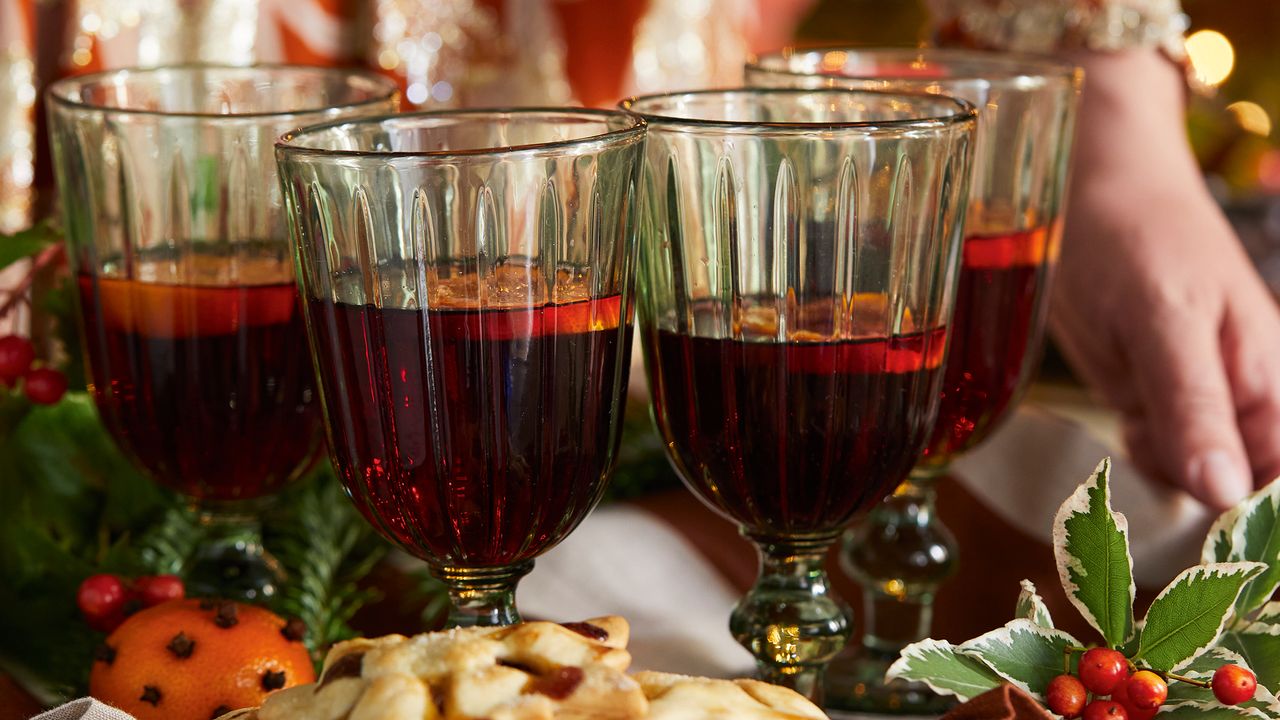Is mulled wine good for you? 5 surprising effects of drinking the warming festive favourite
This spiced Christmas drink is actually better for you than you might think - but can it still give you a hangover?

Mulled wine is a winter drink that has long brought on the festive feels, but its origins are steeped in medicinal benefits – and, when drunk in moderation, experts believe it could offer some wellbeing benefits you may not have known about.
Romans first heated red wine as a means of defending their bodies against the harsh winter months and, as its popularity continued throughout the Middle Ages, various spices were added to avoid sickness. This could mean that a glass or two over the festive season is good for us – so, what are you waiting for? Bottoms up!
1. It may help ward off colds
Red wine, the main ingredient of mulled wine, is packed full of antioxidants, polyphenols and flavonoids, all of which are immune boosting. "Flavonoids have antiviral properties, which means they can help build up your immune system and, in theory, keep those winter colds at bay," says Dr Deborah Lee from Dr Fox Online Pharmacy.
Citrus fruits added to the wine amp up the vitamin C content and many of the traditional spices thrown in also have warming, antiviral powers – brilliant at staving off colds and flu.
Dr Deborah Lee (MB ChB, FFSRH, MFFP, MRCGP, DRCOG, Dip GUM, Dip Colp, LOC Med Ed) trained as a GP and worked for many years in the NHS, mostly as Lead Clinician within an integrated Community Sexual Health Service. She now works as a health and medical writer, with an emphasis on women's health, including medical content for Dr Fox pharmacy. She has published several books and remains passionate about all aspects of medicine and sexual health.
2. It could relieve trapped wind
Mulled wine contains many gut-friendly ingredients. "Cinnamon is good for gastrointestinal problems, nutmeg helps soothe indigestion and star anise contains anethole – a compound that helps to relieve tummy spasms and wind," says Dr Lee.
Just don’t overindulge, as this may bring on the festive flatulence.
3. Your memory might improve
Resveratrol, a chemical found in red grapes and therefore red wine, has been linked to slowing down memory loss.
Sign up for the woman&home newsletter
Sign up to our free daily email for the latest royal and entertainment news, interesting opinion, expert advice on styling and beauty trends, and no-nonsense guides to the health and wellness questions you want answered.
"Resveratrol is a powerful antioxidant that has been proven to boost memory and cognitive function, meaning that it could potentially help keep the brain healthy," says Dr Lee. "It has also been shown to protect against heart disease, cancer, diabetes and obesity."
4. Your skin may look younger
"As well as helping to protect you from age-related degenerative diseases, research has shown that resveratrol can also contribute to younger-looking skin," says Dr Lee.
"It triggers collagen production, which improves the skin’s elasticity, and its anti-inflammatory properties can relieve inflammation. All have a positive effect on maintaining a youthful appearance."
5. You can still get a hangover
Many people ask 'Can I get a hangover from mulled wine?' And the answer, says Dr Lee, is unfortunately yes. Mulled wine still has a high alcohol and sugar content, so you should be aware of how much you’re consuming.
"People often think that because it’s been heated it’s less alcoholic, but only a small amount actually evaporates, explains Dr Lee. "Red wine also contains congeners – compounds that can increase the severity of a hangover – so go easy."
How to make mulled wine
In a large saucepan, pour 1 bottle of red wine, add 1 quartered orange stuffed with cloves, 2 cinnamon sticks, 1tsp nutmeg, 2tbsp brown sugar and 1 shot of port (optional). Gently heat for 20 minutes, allowing the spices to infuse and the wine to warm through. Alternatively, why not try making mulled wine in a slow cooker?
This could contain 1-3 units of alcohol per drink, depending on your mug size and alcohol strength of your recipe.
As ever, you should drink mulled wine (and indeed any alcohol) responsibly, and limit yourself to no more than 14 units of alcohol per week. Contact your GP or an organisation like Drink Aware if you’re struggling.

This article first appeared in woman&home magazine last Christmas. Subscribe to the magazine for £6 for 6 issues.
With over two decades of magazine and digital experience, Samantha has extensive knowledge of writing about menopause, Minecraft - and pretty much everything in between. With roots in pop culture and celebrity journalism, she has interviewed top talent and written features for a wide range of outlets including ELLE, The Guardian, Stylist, Grazia, The Sun’s Fabulous, Psychologies and, more recently, woman&home.
-
 Refresh your home, protect your loved ones: the finishing touch for a safer Spring
Refresh your home, protect your loved ones: the finishing touch for a safer SpringFireAngel is urging homeowners to check their fire alarms and carbon monoxide monitors this Spring with their 'Refresh & Protect' programme
By Laura Honey Published
-
 Christine Lampard’s Phase Eight co-ord just revived our confidence for wearing horizontal stripes
Christine Lampard’s Phase Eight co-ord just revived our confidence for wearing horizontal stripesChristine Lampard proves beyond doubt that we don't need to daunted by the idea of wearing on-trend horizontal stripes this season
By Emma Shacklock Published